Taming the Cable Monster: Why a Tidy PC Matters
ATX case cable management can make the difference between a high performance gaming PC build that runs cool and quiet versus one that overheats. Good cable routing isn't just about looks; it's about getting the most from your investment.
Key ATX Case Cable Management Benefits:
- Improved airflow - Cables won't block fans or air intakes.
- Lower temperatures - Better cooling keeps components at peak performance.
- Easier maintenance - Clean routing simplifies upgrades and troubleshooting.
- Professional appearance - Tidy builds properly showcase your components.
- Component longevity - Cooler temperatures mean your parts last longer.
As one expert puts it: "A clean PC build is a healthy one, and managing cables is equally as important as selecting the right components."
Tangled cables restrict airflow, causing overheating that can throttle performance, increase noise, and shorten component lifespan. They also attract dust, making cleaning more difficult.
The good news is that modern ATX cases are designed to make cable management easier than ever. With features like PSU shrouds, motherboard tray cutouts, and dedicated routing channels, even first-time builders can achieve professional results.
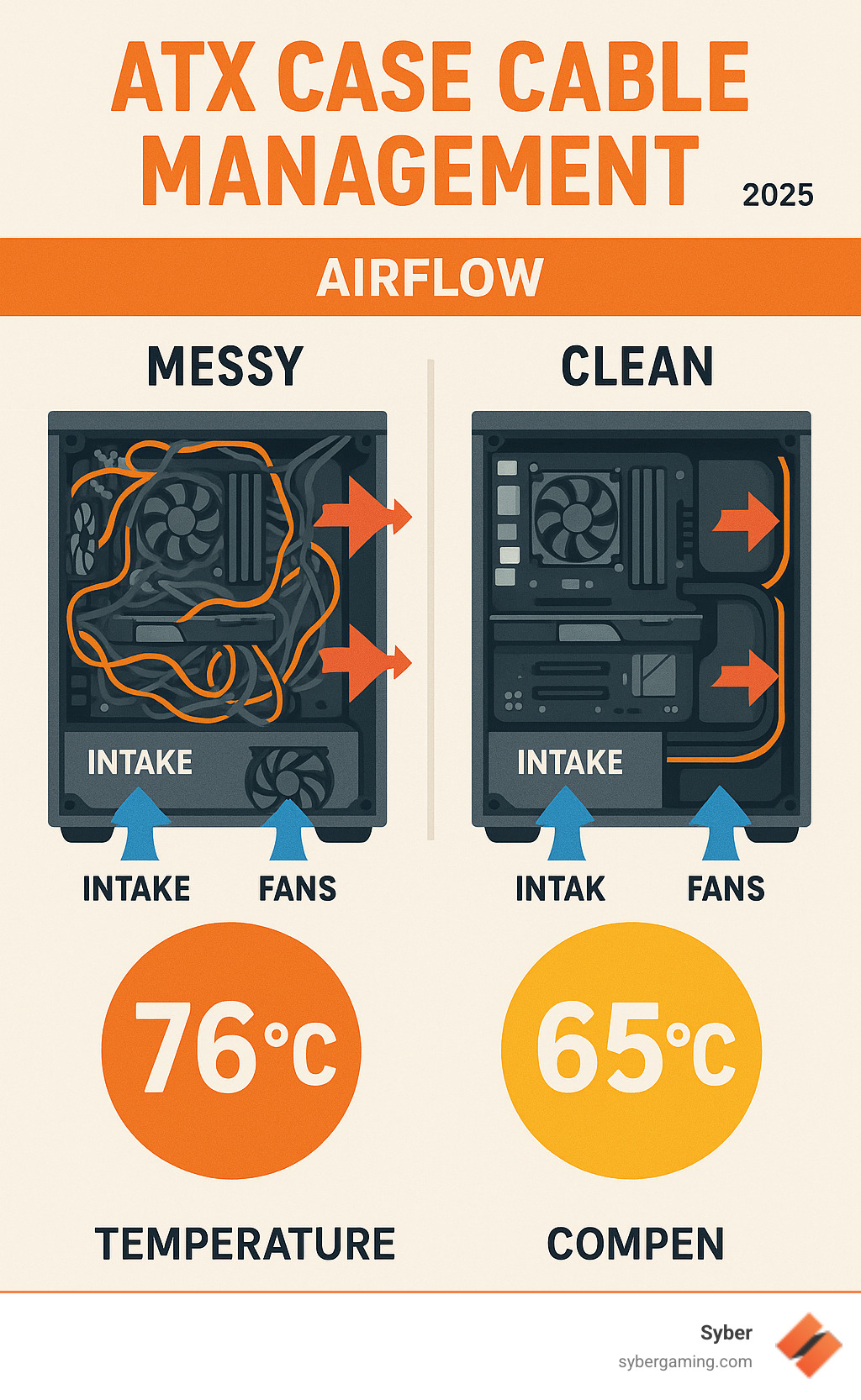
Atx case cable management glossary:
Key Features for Superior ATX Case Cable Management
Building a high performance gaming pc isn't just about picking the fastest processor or graphics card. How you organize your cables can make or break your system's performance and longevity.
The Triple-Threat: Better Cooling, Performance, and Looks
Great ATX case cable management delivers three key benefits. First is airflow. Scattered cables block the flow of cool air in and hot air out, making fans work harder and temperatures climb.
This directly impacts performance. When a CPU or GPU gets too hot, it automatically slows down to prevent damage—a process called thermal throttling. This isn't a minor dip; it can be the difference between a smooth gaming experience and a stuttering one. A well-managed case might keep a GPU at a stable 70°C under load, allowing it to maintain its maximum speed. A messy build could see it spike to 85°C or higher, forcing the card to reduce its speed and costing you real, measurable performance.
Proper cable routing also makes your high performance gaming pc build look stunning. Beyond aesthetics, a tidy system simplifies troubleshooting and upgrades. Need to swap a RAM stick, add a new SSD, or diagnose a connection? With clean routing, every component is accessible. You will not have to fight a web of wires to reach a SATA port or a fan header, which is especially crucial for AI-driven performance systems that need consistent cooling for demanding tasks like AI graphics rendering.
For deeper insights into maximizing your build's potential, check out what to consider when buying a gaming PC.
Essential Tools for a Clean Build
The most effective tools for ATX case cable management are simple and affordable.
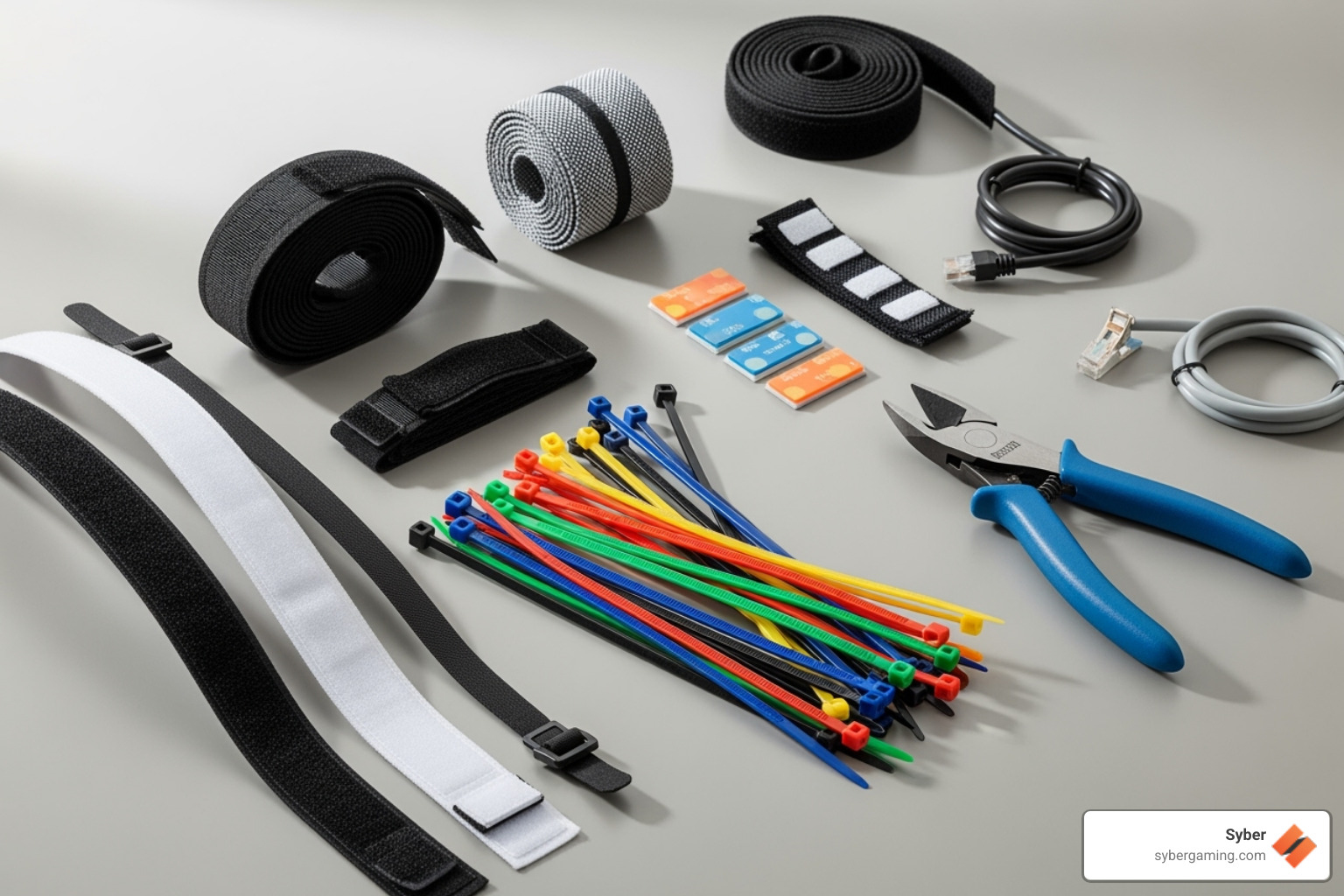
- Velcro straps: These reusable ties are perfect for bundling large groups of cables. They come in rolls you can cut to size or as pre-sized strips, allowing you to easily add or remove cables later.
- Zip ties: Ideal for securing cables tightly to anchor points in the case. They provide a very secure hold, but do not overtighten them, as this can damage the internal wires. Consider getting reusable zip ties for areas you might adjust in the future.
- Cable combs: These small plastic guides clip onto individual power cables (like the GPU and motherboard power) to keep the wires perfectly straight and parallel for a professional look.
- Flush cutters: Essential for trimming zip ties cleanly. Standard scissors or wire cutters can leave a sharp plastic nub that can scratch you or other cables.
The most important tool, however, is patience. Rushing the process leads to a mess. Take your time to plan your routes for a build you can be proud of.
Choosing a Case for Easy ATX Case Cable Management
Your case choice sets the foundation for a clean build. Modern ATX cases have features that make routing almost effortless for custom build gaming pcs.
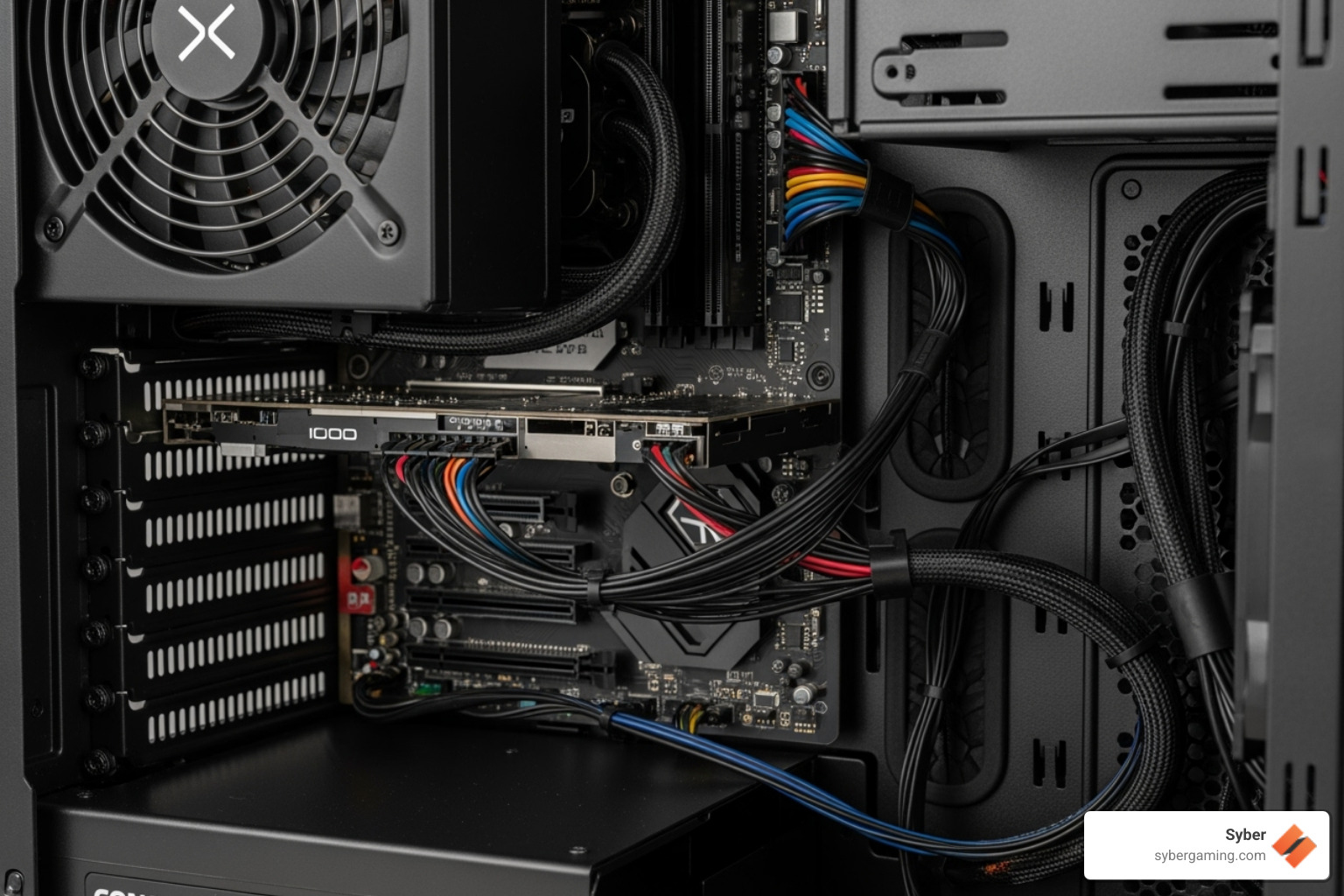
- PSU shrouds: These covers hide the power supply and its bulky cables, instantly cleaning up the build's appearance.
- Motherboard tray cutouts: Strategically placed holes, often with rubber grommets, let you route cables behind the motherboard tray.
- Space behind motherboard tray: This is perhaps the most critical feature. Look for cases with at least 25-30mm (about one inch) of clearance. This gap is where the bulk of your cables will live. Too little space, and you will struggle to put the side panel back on.
- Tie-down points: These anchor spots are used with zip ties or Velcro to secure cable bundles and prevent them from moving.
- Dedicated cable channels: Some cases include channels or pre-installed straps to guide large cables, speeding up the build process.
- Removable Drive Cages: Many cases allow you to remove unused hard drive cages. If you only use M.2 or 2.5-inch SSDs, removing the large 3.5-inch drive bay can open up a huge amount of space, improving airflow and giving you more room to tuck away excess PSU cables.
The Syber M Series exemplifies case design that makes cable management easier for high performance builds.
Simple Steps for a Clean High Performance Gaming PC Build
Building a high performance custom prebuilt gaming pc with pristine cable management is a systematic process.

- Plan your routes. Before installing anything, identify your case's management features and visualize the cleanest path for each cable.
- Install components logically. Install the motherboard, CPU, and RAM first, then the PSU. If your power supply is modular, only connect the cables you absolutely need for your components.
- Route main power cables first. Start with the large 24-pin motherboard and 8-pin CPU power cables, running them behind the motherboard tray and through the nearest cutouts.
- Bundle smaller cables. Group smaller cables like SATA data and front panel connectors and route them together. The thin front panel wires can be twisted into a single, neater bundle and run along a case edge.
- Manage Fan Cables. Plan how you will connect your case fans. If your motherboard has enough headers, run each cable directly. If not, a fan hub can be a great investment. A hub centralizes all fan connections, meaning you only need to run one or two cables to the motherboard, drastically reducing clutter.
- Test everything. Before closing up the case, power on the system to verify all connections work and ensure no cables obstruct any fans. This is a critical step for ensuring your robust cooling system functions correctly.
Advanced ATX Case Cable Management for a Pro Look
Advanced techniques can lift your custom build gaming pcs from tidy to professionally crafted.
- Custom sleeved cables: A major aesthetic upgrade, these replace standard PSU cables with options in uniform colors and premium materials. You can get 'extensions,' which plug into your existing cables, or a full 'replacement kit' made specifically for your modular power supply model.
- Strategic cable comb placement: Using multiple combs along visible cables like the GPU and motherboard power creates perfectly parallel wires for a precise, architectural look.
- Aesthetic routing: This makes visible cables part of the design through clean 90-degree bends or symmetrical runs that complement the hardware.
- Fan cable management: Tucking and routing fan cables along case frames or directly to the back of the case prevents visual chaos and improves airflow.
For inspiration, explore the Syber Cube Gaming PC, which showcases how thoughtful cable management contributes to performance and aesthetics.
Mistakes to Avoid for Optimal Cooling and System Health
Even experienced builders can make mistakes that undermine a high-performance gaming rig that needs consistent cooling.
- Blocking airflow paths: Keep cables away from intake and exhaust fans. A single stray cable can create turbulence and disrupt a carefully planned airflow path.
- Pinching cables: When putting the side panel on, ensure no cables are squeezed or bent sharply, which can cause connection issues or damage the wire.
- Overtightening zip ties: Secure bundles firmly but gently. Too much tension can damage the internal wires and insulation.
- Forgetting to Plan for the GPU: Modern graphics cards often require two or three thick power cables. Plan their route before installing the card to ensure a clean run that does not put strain on the GPU's connectors.
- Forgetting future maintenance: Use reusable Velcro straps in areas you might access later for upgrades, like around drive bays or main power leads.
Avoiding these pitfalls ensures your ATX case cable management contributes to the performance and longevity of your high performance desktop pc.
Your Build Deserves a Clean Slate
ATX case cable management is the secret ingredient that transforms a good high performance gaming pc into an exceptional one. You've invested in top-tier components; don't let tangled cables choke their airflow and put a speed limit on their power.
The benefits are clear: your system runs cooler, your components last longer, and your build looks professional. Best of all, it's completely achievable. Modern ATX cases provide PSU shrouds, strategic cutouts, and ample routing space. With some basic tools and patience, even first-time builders can create a clean setup.
A tidy build also pays off long-term, making it easier to upgrade your AI-ready gaming PC or troubleshoot an issue. At Syber, we know that meticulous cable management separates good builds from great ones. Our custom build gaming pcs reflect this philosophy, with every cable purposefully routed to ensure optimal airflow and performance, especially for demanding tasks like AI graphics rendering.
Your investment in a high performance desktop pc deserves the thoughtful organization that lets every component perform at its best.
Ready to see what professional-grade cable management looks like? Explore our expertly crafted M-Series custom build gaming pcs and find how attention to detail creates gaming systems that perform as beautifully as they look.


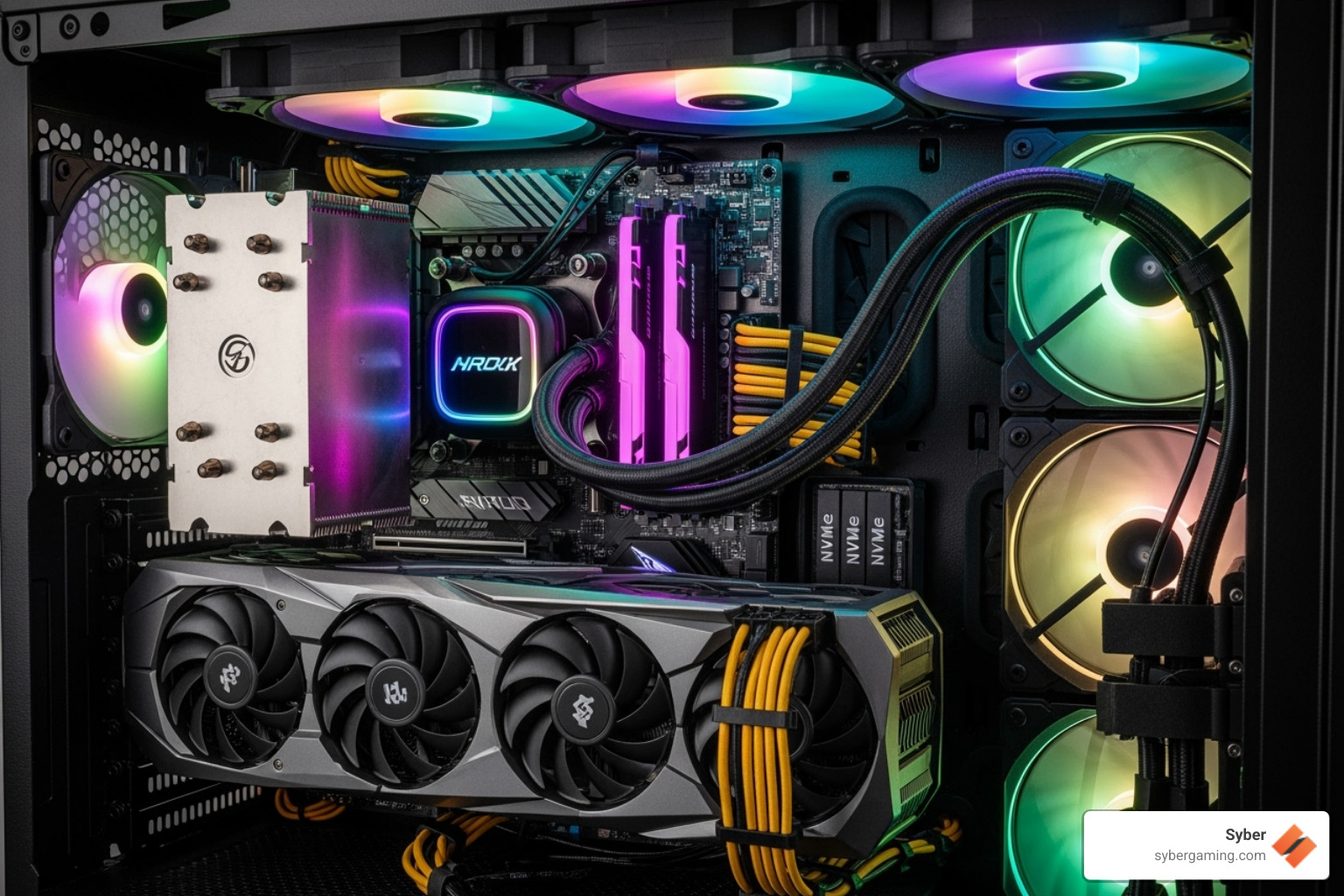

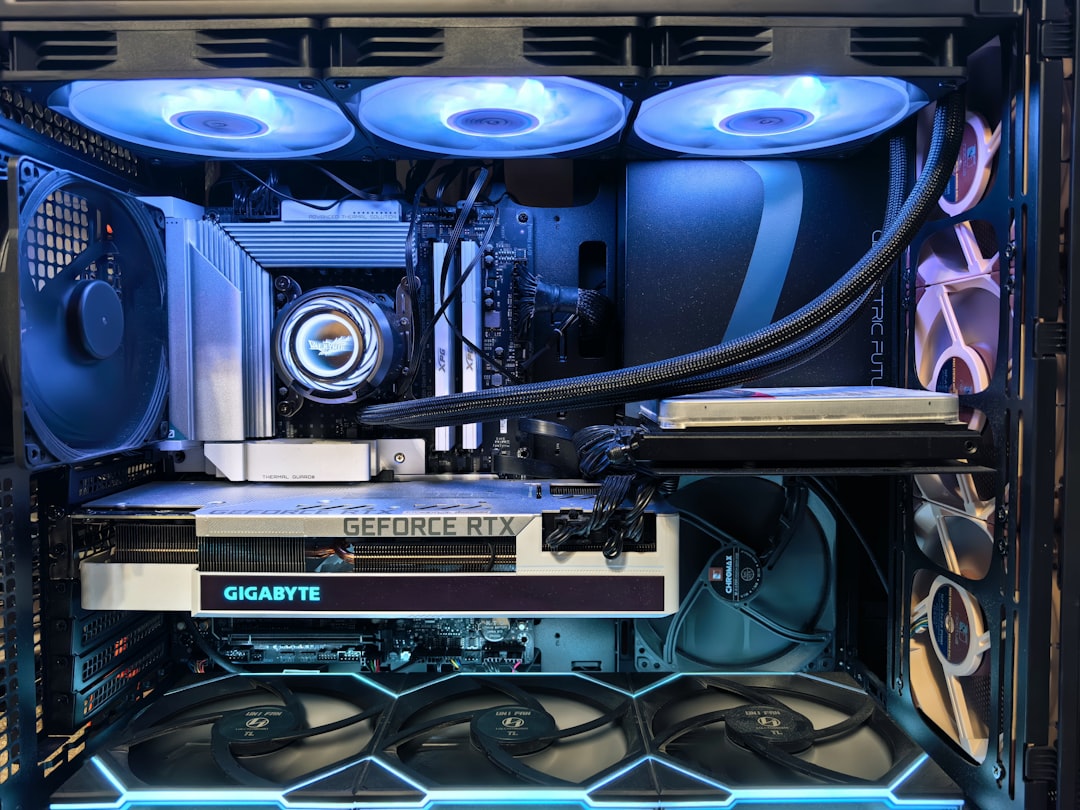

.svg)

